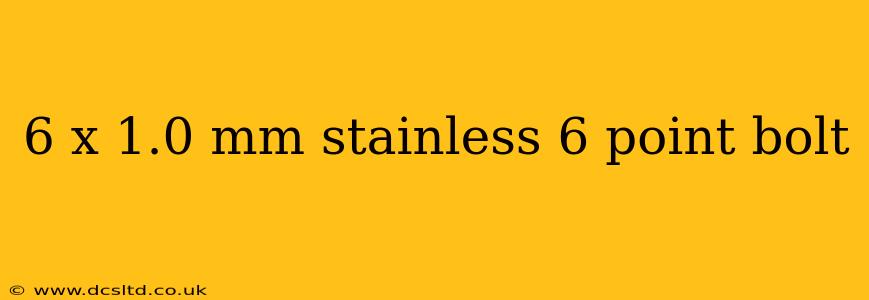Finding the right bolt for your project can be tricky, especially when dealing with specifications like "6 x 1.0 mm stainless steel 6-point bolt." This guide will break down the meaning of these specifications, explore their applications, and answer frequently asked questions.
Understanding the Specifications: 6 x 1.0 mm Stainless Steel 6-Point Bolt
Let's dissect the specifications to understand what this bolt represents:
-
6: This refers to the nominal diameter of the bolt, measured in millimeters (mm). It signifies that the bolt has a shaft diameter of approximately 6mm. Note that the actual diameter might slightly vary depending on manufacturing tolerances.
-
1.0 mm: This indicates the thread pitch. The thread pitch is the distance between two consecutive threads on the bolt. A 1.0 mm pitch means there's 1 millimeter of distance between each thread. A finer pitch (smaller number) generally means a stronger, more precise connection.
-
Stainless Steel: This material designation is crucial. Stainless steel offers superior corrosion resistance compared to carbon steel, making it ideal for outdoor applications or environments with high humidity. Different grades of stainless steel exist (e.g., 304, 316), each with varying corrosion resistance and strength properties. The specific grade isn't mentioned here, so further clarification might be needed depending on the application.
-
6-Point: This refers to the bolt head's shape. A 6-point head (also known as a hex head) is the most common type and is designed to be used with a wrench or socket that has six sides. The 6-point design offers a better grip and reduces the risk of rounding the head compared to a 12-point head.
What are the Applications of 6 x 1.0 mm Stainless Steel 6-Point Bolts?
Given their size and material, these bolts are suitable for a range of applications where corrosion resistance and moderate strength are required. Some examples include:
- Light-duty fastening: Securing components in machinery, equipment, or appliances where heavy loads are not expected.
- Automotive applications: Fastening non-critical components in vehicles, particularly in areas exposed to the elements.
- Marine applications: Suitable for applications requiring corrosion resistance in a marine environment.
- Electronic enclosures: Securing panels or internal components in electronic devices.
What is the difference between a 6-point and a 12-point bolt head?
A 6-point bolt head provides a stronger, more even distribution of force when tightened, reducing the risk of rounding the bolt head. A 12-point bolt head, while offering more access points for a wrench, can be more susceptible to rounding if not properly tightened. For general-purpose applications, the 6-point head is preferred for its superior durability.
What type of wrench do I need for a 6 x 1.0 mm 6-point bolt?
You'll need a wrench or socket that fits the 6-point head of the bolt. The size of the wrench will depend on the bolt head's width across the flats (often referred to as the "size" of the hex head). Consult a metric wrench size chart to determine the appropriate wrench size for your specific bolt.
Where can I find 6 x 1.0 mm stainless steel 6-point bolts?
These bolts are commonly available from hardware stores, both online and brick-and-mortar, as well as fastener specialists and industrial supply companies. When searching online, using specific keywords like "M6 x 1.0 mm stainless steel hex bolt" will yield better results. Remember to specify the grade of stainless steel if you have specific requirements.
Are there different grades of stainless steel for these bolts?
Yes. Different grades of stainless steel offer varying degrees of corrosion resistance, strength, and other properties. Common grades include 304 and 316 stainless steel. 316 stainless steel generally offers superior corrosion resistance than 304, making it a better choice for marine or highly corrosive environments. The grade will usually be specified by the manufacturer or supplier.
This guide provides a comprehensive overview of 6 x 1.0 mm stainless steel 6-point bolts. Remember to always consult relevant safety guidelines and use appropriate tools when working with fasteners. If you have a specific application in mind, consulting with a fastener specialist can help ensure you select the most suitable bolt for your needs.
